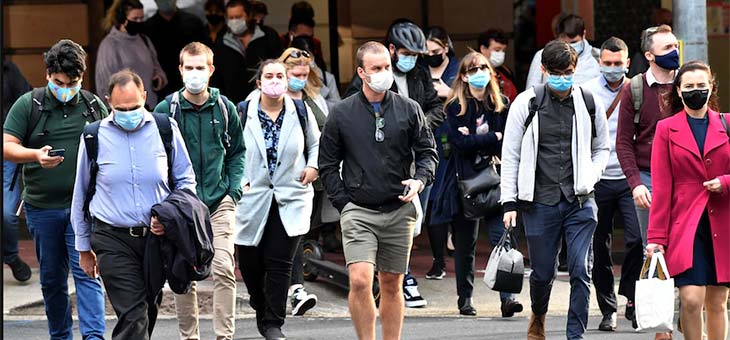The world will likely be playing “cat and mouse” with the virus that causes COVID-19 for the rest of our lives, a leading virologist says.
The University of Sydney’s Eddie Holmes was named NSW’s Scientist of the Year in 2020 for his work early in the pandemic establishing that SARS-CoV-2 was the cause of COVID-19.
He was also one of the first people to publicly release the genome sequence of the virus.
As NSW, Victoria and the ACT battle significant outbreaks of the Delta variant and race to get more people vaccinated, there is a great deal of focus on how the weeks and months ahead will look.
Professor Holmes has his focus fixed a few steps further, and he has some predictions about what role the virus might play in our lives in the years to come.
The best case scenario
Even under what Professor Holmes calls the “best case scenario”, the virus is here to stay.
“Best case scenario, the virus is never going to go away, but maybe quickly it will evolve to become less virulent,” he said.
“So [it could become] like a common cold coronavirus, which we all get every year. We all get multiple common colds a year, they’re related viruses and we don’t hear much about them.
“That’s possible, but unlikely.”
He said when considering this scenario it was important to remember that viruses don’t always evolve into “nastier” variants — sometimes they become more benign.
The worst case scenario
“It just keeps getting worse and we get these new variants like Delta that make the virus more infectious, more virulent,” Professor Holmes said.
“They keep springing up and they start to evade the vaccines.
“It’s a real uphill struggle. That’s the worst case scenario.”
The most likely ‘middle ground’ scenario
Professor Holmes said the virus had already shown its capacity to evolve by changing and infecting hundreds of millions of people around the world.
He predicted the virus would “keep generating diversity” that would be enabled, in part, by parts of the world with very low vaccine coverage.
“Even in well-vaccinated countries like the UK and Canada, you are seeing some vaccine hesitancy,” he said.
“That’s going to allow the virus to keep itself going, to keep evolving, keep changing.”
He said under that scenario, it would be possible to “dampen down SARS-CoV-2 for a few years”.
“It would be a seasonal thing, and then maybe two or three years down the track we would get an outbreak, where the virus has evolved to escape the vaccine, and/or people’s immunity has waned,” he said.
“So you would get a peak, and then we would revaccinate and that will go down.
“Then we’re in this cat and mouse operation that goes on in perpetuity, and that’s kind of where we are with flu.”
Delta variant a surprise
When the virus emerged, Professor Holmes was involved in efforts to predict how the virus might change in the medium to long term.
He said in terms of vaccines, we were in a better scenario than he had predicted, with effective vaccines developed relatively quickly.
But he said he had not expected a variant like Delta to emerge as quickly as it had.
“What’s actually happened is the virus is considerably more infectious than the first variant that emerged,” he said.
“It also appears to be more virulent, so you’re seeing higher mortality levels, particularly in younger people.
“That’s a much worse place we are in now than I thought we’d be in a year or so ago.”
‘Morally reprehensible’ global vaccine disparity
At the moment, Australian leaders are largely focused on domestic vaccination rates laid out under a national roadmap leading away from lockdowns.
Professor Holmes said vaccinating the population was crucial, but a global approach to vaccination was also urgent.
He said Australia should share resources with countries that don’t have vaccine access, such as many African nations.
The latest data shows 33.3 million people, or 2 per cent of people in African countries, had been fully vaccinated.
That is compared with 242 million people, or 40.9 per cent of those who reside in North America.
“That’s morally reprehensible and it’s also scientifically incorrect,” he said.
“Those places where there’s uncontrolled virus spread, the virus will generate more diversity … that could trigger the evolution of viruses worse than you’ve got today.”

